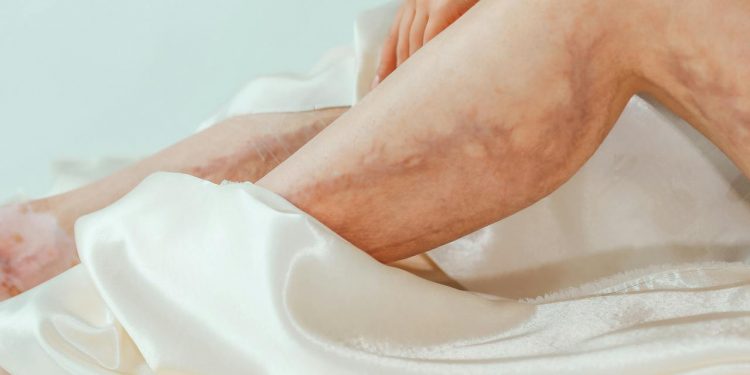Defining Varicose Veins
Varicose veins are characterized by enlarged red, purple or blue veins that can affect an individual’s comfort level and overall wellbeing. It is important to understand how veins function in the body to recognize the symptoms, prioritize health, and explore the vein disease treatment provided by vascular surgeons to effectively manage this condition.
The Importance of Veins in the Human Body
Veins play a role in the system by transporting deoxygenated blood back to the heart. Veins work together with your arteries and capillaries to ensure that of your cells receive oxygen and nutrients while eliminating waste. While a varicose vein is not typically life threatening, they can cause some degree of discomfort and lead to serious health complications if not addressed.
Common Symptoms of Varicose Veins
Symptoms of a varicose vein may include swelling and enlargement of veins, a sensation of heaviness or swelling in the legs, leg pain, skin discoloration or darkening near the affected veins as itchy skin. These symptoms can be bothersome, which can signal issues that necessitate evaluation by a vascular surgeon.
How Vascular Surgeons Diagnose & Treat Varicose Veins
Vascular surgeons play a role in assisting individuals with varicose veins by offering specialized care and expertise in vein disease treatment. Vascular surgeons undergo comprehensive training which provides them with the necessary knowledge and skills to effectively manage varicose veins. They are knowledgeable about treatment options, including minimally invasive procedures and traditional open surgeries. Their expertise enables them to customize treatment plans based on each patients’ requirements leading to results and patient satisfaction.
The vascular surgeons at The Vascular and Interventional Centre in Singapore offer tailored solutions ranging from surgical approaches like compression stockings to traditional open surgeries such as high tie procedures and vein stripping based on each patients individual requirements.
They also perform inimally invasive procedures such as Radio Frequency Ablation (RFA) Venseal™/VenaBlock Glue Closure, Clarivein™ Mechanochemical Ablation and Cryo Laser and Cryo Sclerotherapy (CLaCs) as effective options with faster recovery times.
Lifestyle Changes for Prevention and Avoiding Complications
Preventing a varicose vein involves maintaining a certain lifestyle. This includes taking part in physical activities like engaging in exercise to boost circulation, avoiding prolonged sitting or standing, wearing compression stockings, elevating the legs, steering clear of tight clothing, staying hydrated, and scheduling routine check-ups to lower the risk of developing varicose veins.
If varicose veins progress to a more severe stage, complications may arise. These could involve insufficiency resulting in leg ulcers or skin changes like eczema or pigmentation. In some situations, deep vein thrombosis (DVT) might occur due to blood clots forming in the veins. It is essential to seek medical attention to prevent these complications.
Understanding varicose veins and how to manage them is crucial for maintaining your health. By identifying symptoms, seeking proper treatment from vascular surgeons, incorporating preventive measures into daily routines, and promptly addressing severe cases, people can effectively handle varicose veins and reduce potential complications for improved overall health and wellbeing.
What To Do After Varicose Vein Treatment
Post treatment care and recovery are very important aspects of managing varicose veins. After undergoing treatment, patients are often encouraged to make lifestyle changes to promote healing and prevent the condition from recurring. These changes may involve exercise to enhance circulation, maintaining an optimal weight, and elevating legs when feasible. By following these lifestyle modifications, patients can aid the healing process.
Regular follow up visits with vascular surgeons are essential for monitoring progress as well as addressing any issues or complications that may arise. These appointments enable your vascular surgeon to evaluate the effectiveness of treatment, track healing progress, and make any modifications to the treatment plan.
Regularly checking on the condition of your varicose veins is crucial during follow up appointments. Detecting them early allows for intervention, while also preventing further complications. By participating in treatment care and attending follow up visits as advised, patients can safeguard their vascular health and reduce the chances of varicose vein recurrence.
Final Thoughts
To sum up, focusing on detection and proactive management of varicose veins through vein disease treatment plays a role in preserving vascular health and averting potential issues. By being attentive to symptoms, seeking assessment, and taking preventive actions, individuals can effectively address varicose veins before they advance to more serious stages. Early detection enables intervention resulting in outcomes and an improved quality of life for those dealing with varicose veins.
Encouraging individuals to seek guidance and treatment for varicose veins is crucial for ensuring care and handling of this common vascular condition. Vascular surgeons possess expertise to offer guidance, customized treatment plans, and ongoing assistance to those affected by varicose veins. By consulting with a vascular surgeon, patients can explore a variety of treatment options tailored to their requirements leading to enhanced results and improved wellbeing.
Raising awareness about varicose veins, promoting early detection, and urging people to consult with vascular surgeons for treatment are important actions in managing this condition effectively. By being proactive, staying informed about treatment choices and working together with professionals, individuals can address varicose veins comprehensively.











